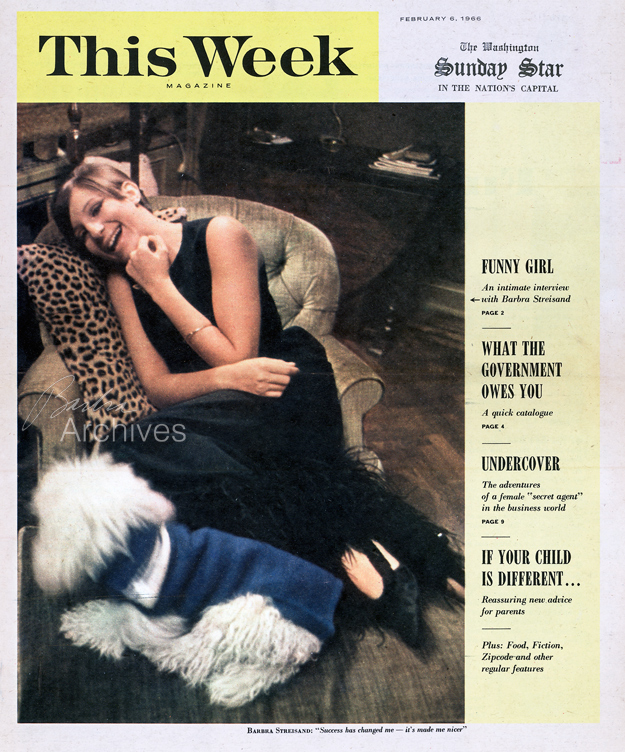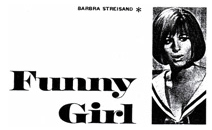This Week Magazine
February 5, 1966


* Two years ago, Barbra Streisand was singing in a Greenwich Village cabaret for $50 a week. Today, after her smash success on Broadway in "Funny Girl" (which she recently left), she earns a five-figure income plus a contract with CBS guaranteeing her a minimum of $5,000,000 in the next five years. Next TV show: March 30. [Editor's note: COLOR ME BARBRA]
Q: Miss Streisand, Frank Sinatra once complained bitterly that the ballad singers of this nation would soon die out because our great popular composers are not writing songs "like they used to" —that rock-'n-roll, non-song has taken over. Do you agree?
A. "Maybe Frank Sinatra has a problem—I don't. I have song-writers who write special material for me and, as long as I'm well provided for, I really can't worry about anybody else. It's true I don't sing rock-'n-roll, because I'm essentially an actress in song and there are no lyrics in rock-'n-roll that mean anything. But musically I love it."
Q: You don't think today's popular music is more infantile than it was thirty years ago in the Benny Goodman era?
A: "Infantile, schminfantile. I believe that people are people—the same in every age—and what is good and right will win out. Plumbing is right. There was plumbing thousands of years ago. The secret of it was lost, but plumbing was so good, so right, that people rediscovered it. If the music of the '30s is so right and good, it will come back. The big things missing from kids' music today are romance and sentiment."
Q: What's left?
A: "Sex—but neurotic sex. It has absolutely nothing to do with the opposite sex—the partner you're dancing with. There's absolutely no rapport. Everybody is self-contained, turned completely inward, with his or her own reveries. There's no communication between people nowadays, and our dancing symbolizes it. But I think it's terrific to let out all our aggressions with body movements. It really doesn't leave much energy for sex. The real sexy dances are the 'sedate' old ones—like the waltz and the fox-trot— where people touched."
Q: What do you mean?
A: "The touching dances are too intimate. I don't like to dance close to anyone except my husband. It's embarrassing and unnatural to suddenly find yourself practically in the embrace of someone you don't love."
Q: What would you say is the biggest challenge fame, money and success have brought to your life?
A: "Success has changed me. It's made me nicer. My need to become famous was so strong I would have been a bitter person had it been frustrated. In school I was an ugly duckling and a loner. Nobody believed I could ever be a great actress and singer except me. My mother laughed at my ambition and told me I was too skinny to aspire to the stage. Now she doesn't know what to make of my success. I believe my individuality—because, let's face it, I am a personality and not just a singer or actress— comes from the feeling of social inadequacy that plagued me as a kid. I was unsure of myself, so I wore white makeup and made myself look like a nut so people would notice me."
Q: Do you think some form of adversity and feeling of inadequacy during adolescence is a prerequisite to great achievement in later life?
A: "Yes."
Q: Well, do the pampered kids of today have enough adversity to make them strive to excel?
A: "No—but why should parents try to manufacture adversity? If people can be happy without suffering those terrible pangs of ambition, who is to say their lives aren't better than the ones who had an uncontrollable itch to prove themselves to the world? Anyway I don't want too many great people floating around. Why encourage the competition?"
Q: What do you think is the biggest stumbling block standing between a young performer and success on Broadway, TV and the movies?
A: "Those producers and agents who always seem to be standing between you and your first job. Making the rounds is the most degrading thing you can do. It's like a door-to-door salesman—only the merchandise you're selling when they let you get one foot in the door is yourself. Luckily I had pride and dignity. I'd only make the rounds for two days a week instead of every day like everybody else. And I'd never return to the same office twice. They have a strange hunger for power, these people who are in a position to open or close the door to whatever you want, and I resented it, so I said, "The devil with you. I'll make you all come to me. I'll never come and wait or knock on your door again." And I didn't."
Q: How does the reality of success measure up to your childhood dreams of glory?
A: "It doesn't come close. It hasn't come anywhere near it. The dream—you never achieve it and that's what's depressing. The excitement of life lies in the hope, in the striving for something rather than the attainment. I'm a practical person—to me it's a real drag that you can't hold success in your hand like a hard-boiled egg."
Q: But isn't it wonderful to be so rich you can do absolutely anything you want?
A: "I'm still the same Streisand with or without money. I still like to eat hot dogs. The only difference is that now, instead of eating them inside the delicatessen, I munch them in the back seat of our Bentley parked outside. I always used to say I'd be chauffeured around. But I'm too practical-minded. We had a chauffeur for a few days. But he washed his socks in the kitchen sink and used our bathtub when we were out, so we had to get rid of him. Besides, it's not my nature to make someone wait around for me 24 hours a day until I decide whether to go out or not. Incidentally, you might be interested to know my accountant only gives me $25 a week pocket money, and I don't even spend that. I save it, but I don't tell anyone."
Q: Would you like to list some of the rewards and gratifications that success has brought you?
A: "Are you kidding? When I was younger, I said to myself that some day I was going to excel in every medium—Broadway, TV, movies, records and concert hall. Now I'm paying the penalty. I have a beautiful library at home—full of books. But I don't have time to read them, and I hate that. I'm under pressure because I excel in all things. I design my own album covers. I insist on the artistic control over everything I do. On my TV show I am not only the producer, but I oversee the lighting, the sound, and everything else. CBS doesn't have any idea of what my show's going to be be until I produce it. They wanted to force me to have a guest star on my last program, but I wouldn't allow it. Who do you think writes my show? Do you think I just mouth someone else's words? I write it. I don't want anything I do to be ordinary. It has to be very special. I've been taking Italian lessons and I hope soon to start piano, ballet ad tennis lessons. When I go to Paris soon—and I'm beginning to doubt if my dream of going there will ever be realized because of all my obligations—they're going to expect me to speak French because they've heard me sing French. So I'm studying French, too. I can't get away on vacation. I'd like to have children. But I don't have time to have a baby. It's terrible. Why I've only done ten live concerts in my own country. And I've got to do the movie of 'Funny Girl' and make at least two new albums a year including designing the cover. Most of all, of course, I'd like to sing opera ... I don't know how I'm going to fill all my contractual obligations, but I know I'll have to calm down soon and take it easy or there'll be trouble."
Q: Miss Streisand, you've been sounding a little depressed and negative in what you've been saying ...
A: "That's because I'm hungry. I really ache inside from hunger. I don't even have time to eat."
END.
